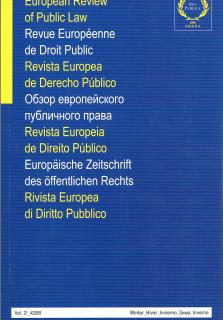
Administrative Law / Droit administratif
France
Professeur à l’Université de Paris I (Panthéon-Sorbonne)
This chronicle gives an account of the different important events which took place during the academic year 2008-2009. The administrative jurisprudence has advanced in many respects, more in particular by significantly contributing to the elaboration of a prison law, allowing the law to further reach the prison environment, and by extending the conditions of the liability of public authorities, particularly by considering that an ordinary fault, rather than a gross fault, in the organisation or the operation of prison services is enough to engage State liability, or by recognising the latter in case of lack of schooling for handicapped children. On the field of liability, an important contentious opinion of the Conseil d’Etat closes the legal debate raised by State liability on the deportation and the compensation for damages resulting from it, if not before the judicial jurisdiction to which it is still referred, at least before the administrative jurisdiction. The principle of equality is still sanctioned both as far as access to public services and access to public employment are concerned. A solution, more questionable, has been adopted establishing one of the broadest concepts of the possibility for an additional clause to a public contract. A new stage of reform of the Conseil d’Etat and of the administrative jurisdiction has officially began, and has carried out a change in the name of the Government Commissioner, to Public Rapporteur, and has authorised the parties to speak after the intervention of the Public Rapporteur during the public hearing; the constitutional revision has reinforced the advisory capacity of the Conseil d’Etat by allowing the parliamentarians to refer to it for opinions on the bills; by promoting the legislative power of the Conseil d’Etat, Article 39-3 new of the Constitution leads to a transfer of this institution within the public authorities. An important, and long-awaited, reform of the archives law has occurred, revamping both the definition, the access and the protection of this national heritage.
La chronique rend compte de différents événements marquants intervenus au cours de l’année universitaire 2008-2009. La jurisprudence administrative a progressé à plusieurs égards, en particulier en contribuant fortement à la construction d’un droit pénitentiaire permettant de faire pénétrer plus avant le droit au sein du milieu carcéral, et en étendant les conditions de la responsabilité de la puissance publique, notamment en estimant qu’une faute simple, et non plus une faute lourde, dans l’organisation ou le fonctionnement des services pénitentiaires suffit à engager la responsabilité de l’Etat, ou en reconnaissant cette dernière en cas de carence de scolarisation d’enfants handicapés. Sur le terrain de la responsabilité, un important avis contentieux du Conseil d’Etat clôt le débat juridique né de la responsabilité de l’Etat dans la déportation et la réparation des préjudices qui en ont résulté, sinon devant la juridiction judiciaire qui en demeure saisie, du moins devant la juridiction administrative. Le principe d’égalité est encore sanctionné tant quant à l’accès aux services publics, comme dans le cas de l’accès aux emplois publics. Une solution, plus discutable, est adoptée consacrant une conception des plus larges de possibilité d’avenant à un marché public. Une nouvelle étape de la réforme du Conseil d’Etat et de la juridiction administrative a été engagée par voie réglementaire, et a procédé au changement de dénomination du commissaire du gouvernement, devenu rapporteur public et a autorisé les parties à prendre la parole après l’intervention du rapporteur public lors de l’audience publique; la révision constitutionnelle a renforcé la fonction consultative du Conseil d’Etat en permettant aux parlementaires de le saisir pour avis sur des propositions de lois; en promouvant la fonction législative du Conseil d’Etat, l’article 39-3 nouveau de la Constitution conduit à opérer un déplacement de cette institution au sein des pouvoirs publics. Une importante, et attendue, réforme du droit des archives est intervenue, rénovant tant la définition, l’accès que la protection de ce patrimoine national.





















